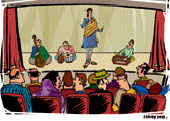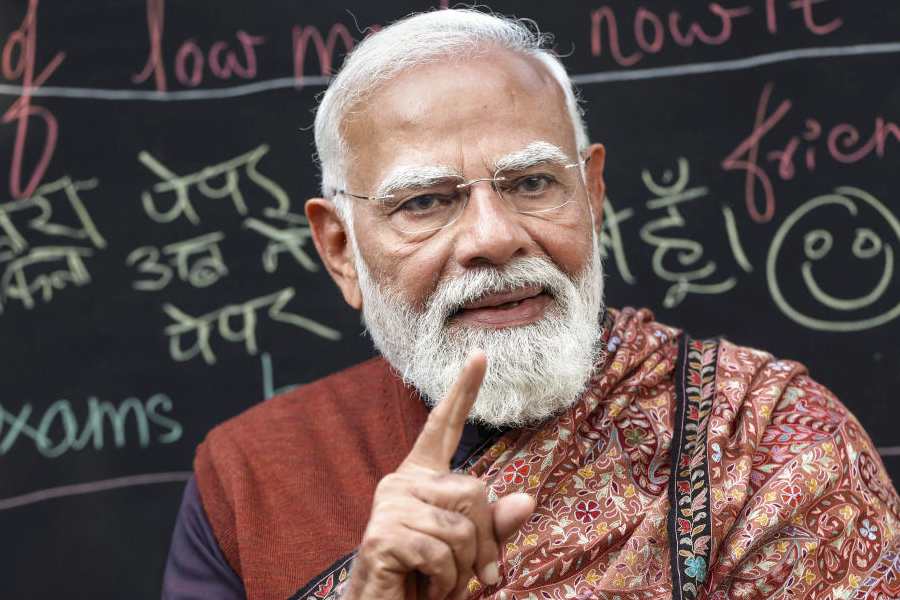 |
By the time Monomoy made an appearance on Ashtami at the Wilson Middle School auditorium in Natick, Boston, the crowd had grown understandably restless. He was a little late, of course, for it is more often than not infra dig for a star to arrive on time.
True to their style, the dadas and boudis, mashis and meshos had placed shawls and water bottles on the choicest seats before hurriedly devouring a most divine Bengali dinner to be on time for the show. A probashi community getting together during Durga Puja, determined to leave nothing out of the Puja food and entertainment package.
Monomoy Bhattacharya strode on to the stage amid his modest troupe of three musicians who had played their part of tuning instruments and adjusting microphones to perfection.
Now our singer is a lean young man, fair and tall, with an air of quiet confidence around him. He is the epitome of what our mashis and boudis would describe as: “Ki shundor dekhtey, ekdom Kartiker moton.” But the setting is Boston and the only comment I heard from a neighbouring boudi was: “Mondo dekhtey noy, dekhi ki rokom gaay.” Thus the programme began with “Aami chini go chini tomaarey, ogo bideshini.”
He sang well and the crowd warmed up to him pretty soon. He sang in a clear, practised and unpretentious voice that we all consider very good entertainment.
But as it transpired, all was not well with one member of the audience — let’s call him D — who waited for the third song to finish before hollering in a typically nasal voice: “Dada, amra ektu naachtey chai.”
D exuded the sort of uppity confidence that comes from being a “local”; in this case, being a member of the organising community.
The crowd laughed politely and I use the word “politely” with much deliberation. Monomoy did not look very amused and went on to sing the next song, chosen tastefully along with the others — classical, old Hindi movie numbers and Bengali favourites, along with a few from his own albums.
D took up the challenge and went on to pester our singer at regular intervals with snide reminders like: “Dada, eta Boston, Kolkata noy. Amra ektu naachtey chai.”
By this time the polite crowd had also turned somewhat confused. It was expected that the artiste, flown across the Atlantic by a probashi community, would pander to what the latter — well, one of its members — desired. And there was this unrelenting artiste, every bit as polite and composed as he had started out to be. Clearly, a war was being waged, a very personal one at that too.
So when the singer requested for a chair, D asked if the artiste was so tired already that he needed to sit down! Monomoy smiled and said he had no such luck, and then went on to place his book on the chair and sing Aye zindagi… from Sadma.
He had clearly saved the best for the last. As the crowd went about requesting old classics from the singer, D managed to squeeze in another “Arre dada, amra ektu naachtey chai je.” Monomoy stopped pacing around the stage, paused, and with a benign smile said: “Naachtey geley kintu bhalo gaan shona jaabey na.”
The apprehension in the air was promptly pierced by thunderous applause. And Monomoy, who had by then begun to remind me of Gladiator’s Russell Crowe in the arena, cheekily turned to the crowd and asked innocently what the applause was for — dance or songs.
The crowd clearly loved him for they shouted and screamed “Gaan, gaan” and clapped madly. One “Serves you right, man” and another “Boo” were also directed at D. Oh well, I have no qualms admitting they came from my husband and me.
Thus it was that one polite crowd put one of its rowdy members in his place and the evening continued as if there had been no pestilence.
I have never bothered to take an iota of interest in Monomoy’s talent before. But seeing him on stage that day, making a sincere effort to present to his audience a fine collection of songs keeping time, place and occasion in mind, I could only feel respect for him. Singularity is a rare commodity in our artistes these days.
We all agreed with what one elderly lady went up to the stage and told Monomoy at the end: “Tomakey dekhey aami bhishon proud feel korchhi.”
Sayantani Biswas has worked with newspapers in Calcutta before relocating to New Hampshire, Massachusetts










